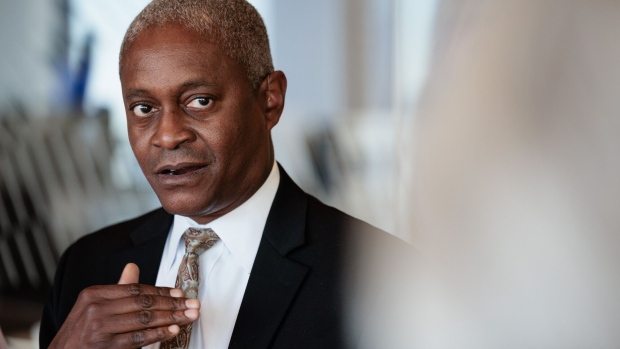Mar 4, 2024
Fed’s Bostic Sees Rate Cut in Third Quarter Followed by a Pause
, Bloomberg News

(Bloomberg) -- Federal Reserve Bank of Atlanta President Raphael Bostic said he expects the Fed’s first interest-rate cut, which he has penciled in for the third quarter, will be followed by a pause the following meeting to assess how the policy shift is affecting the economy.
Bostic, in a separate commentary published on the Atlanta Fed website Monday, said he was worried that businesses have too much exuberance and could unleash a burst of new demand after a rate cut that adds to price pressures. That could be another reason not to cut rates at a rushed pace, he told reporters in a press briefing.
“I would probably not anticipate they would be back to back” cuts, Bostic said. “Given the uncertainty, I think there is some appeal to acting and then seeing how participants in the markets, businesses leaders and families respond to that.”
Bostic’s comments came in advance of Fed Chair Jerome Powell’s monetary policy testimony to Congress on Wednesday and Thursday. The chair is expected to repeat the policy committee’s message that there’s no rush to cut interest rates.
The US central bank chief and nearly all of his colleagues have said in recent weeks that they can afford to be patient in deciding when to cut rates given underlying strength in the US economy and higher-than-expected inflation in January.
The Federal Open Market Committee voted unanimously to leave interest rates unchanged in a range of 5.25% to 5.5% in January, and investors are currently betting the central bank will begin easing in June, according to futures markets. The committee will update its forecasts for rates at the next meeting on March 19-20.
‘Pent-Up Exuberance’
Bostic also said he wants to keep reducing the size of the Fed’s balance sheet at the current pace for some time, rather than moving quickly to taper the reductions.
“In terms of QT I’m hopeful that we can continue the pace that we’re at for as long as possible,” he said. “As we get further from the most acute moments of that emergency, I think it’s appropriate for us to return to more normal posture.”
Businesses revving up spending and investment could boost inflationary pressures, and that could happen at the first hint of an interest-rate cut, Bostic warned.
“This threat of what I’ll call pent-up exuberance is a new upside risk that I think bears scrutiny in coming months,” he said. “ As my staff and I have talked to business decision-makers in recent weeks, the theme we’ve heard rings of expectant optimism.”
Bostic, in his commentary, repeated that he was hopeful the central bank could reduce inflation to its 2% target without a recession, which “would constitute a resounding success by historical standards.”
©2024 Bloomberg L.P.






